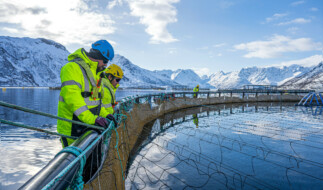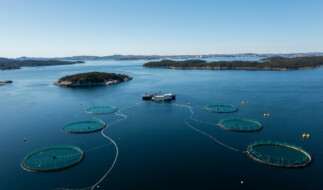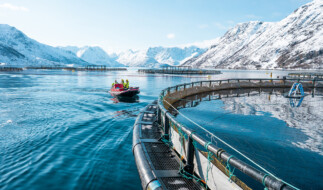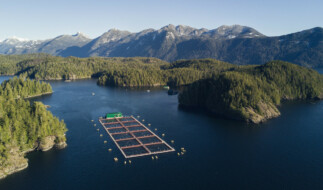Fact Checking “You Are What You Eat” on Netflix
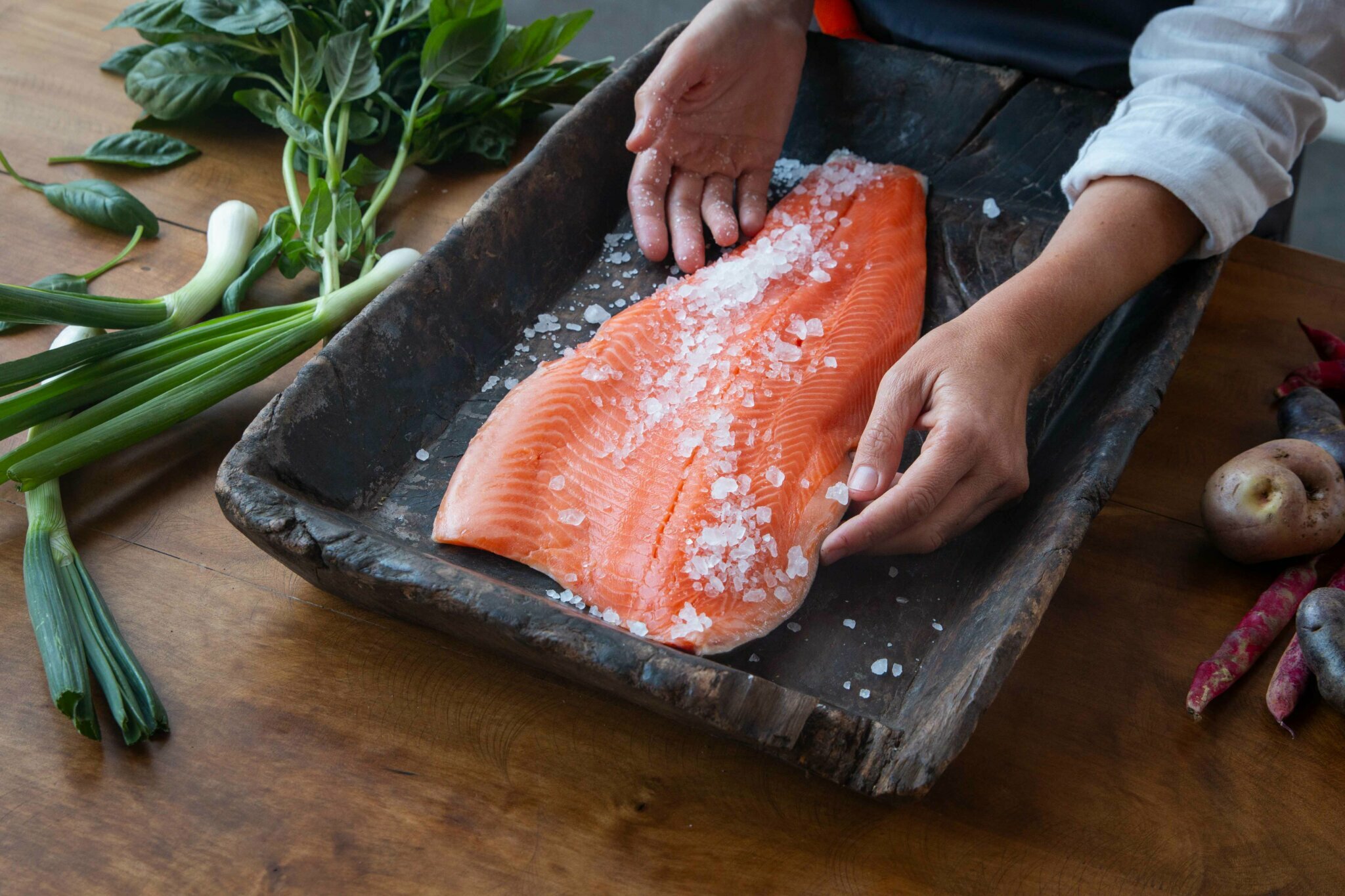
The science is clear: Farmed salmon is a safe and healthy choice. Both farmed and wild salmon provide beneficial nutrients and there is no consistent difference in their health benefits.
The start of a new year is a great time to pause and evaluate your health habits – including what you eat. And, it’s (mostly) great that there’s a wealth of information out there to help people create and sustain resolutions related to dietary choices. However, given the extent of information available these days, it’s important to consider all information carefully to be sure it’s credible and accurate.
Along these lines, we were interested to watch "You Are What You Eat: A Twin Experiment” on Netflix when it launched this January to learn more about the scientific connection between our food choices, genetics and overall well-being. But as we watched, we were disappointed to see the show lacked the type of holistic, factual and balanced information that helps people make educated decisions about their health and left us with more questions than answers.
Here’s a little more about the limitations of the series – and three facts to consider about the misinformation it included about farmed salmon.
What are the issues with the “You Are What You Eat” series?
The four-part documentary series explored linkages between diet, genetics and health by studying four sets of identical twins over an eight-week period. In that time, one twin ate a “healthy” vegan diet, while the other ate a “healthy” omnivore diet.
The series highlighted the broad impacts of diet on health, climate and social issues, but it asserted a pro-vegan bias, claiming to be educational yet lacking in scientific rigor and key details. While it is widely acknowledged the future of food will undoubtedly be plant-rich, it will not be exclusively plant-based as this would come with its own challenges. What the show lacked was a more holistic and nuanced perspective on the food system and some of the broader considerations we each need to make when choosing what to buy and consume.
What’s more, when it comes to the segment on farmed salmon, the research publication the series is based on does not draw any specific conclusions related to seafood and contains no mentions of salmon, farmed or wild. Yet episode three of the series included unsubstantiated criticisms of farmed salmon. Which made us question where this opinion was drawn from.
This commentary stood in stark contrast to the abundant scientific evidence and global consensus among nutrition experts who recommend both wild and farmed seafood – and specifically fatty fish like salmon – as part of a healthy and sustainable diet.
We welcome opportunities to discuss how to transition towards healthy and sustainable diets and food systems. However, these conversations should be grounded in credible science and offer balanced perspectives on the many nuances related to our food system. That’s why we’re sharing the following three questions and answers to provide more clarity to the topics raised, which are backed by research and third-party experts.
Is farmed salmon higher in fat than wild salmon?
No. Farmed salmon has a similar nutrient profile as wild salmon. Research published in 2023 reaffirmed that there is no consistent difference in the health benefits of wild or farmed salmon and that both provide valuable nutrients.
Fat content for salmon can differ by species – whether farmed or wild – as well as other factors such as the type of feed consumed or the time of year when wild salmon is caught.
However, both farmed and wild salmon are recognized by global authorities and nutrition experts for providing high-quality protein, healthy fats (e.g., omega-3 fatty acids) and essential vitamins like vitamins D and B-12. Which is why global health bodies recommend eating two portions of seafood, including farmed salmon a week to get your recommended intake of nutrients.
You can keep farmed salmon and its nutritious benefits on your menu for flavorful, satisfying meals.
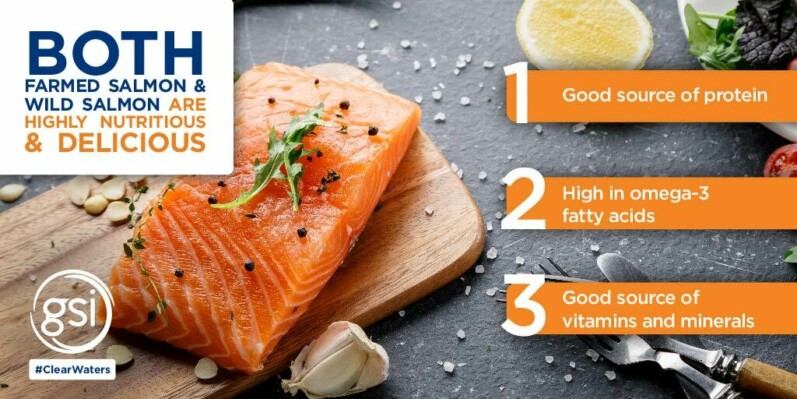
Does farmed salmon have more contaminants than wild salmon?
No. In fact, research from 2020 shows farmed salmon is lower in dioxins and has far less exposure to PCBs and dioxins than wild salmon. Experts have routinely and recently noted that the benefits of eating fish outweigh the potential risks from exposure to contaminants.
If you’re not familiar with PCBs (or polychlorinated biphenyls), they’re human-made chemical compounds that linger in the environment and can build up in the food chain. If there are PCBs present in salmon’s environment or in the smaller fish they eat, then the salmon – wild or farmed – will be exposed to PCBs.
However, farmed salmon has lower contaminant levels because of the careful consideration of their diets. This includes the increased use of plant-based ingredients in farmed salmon feed and the reduced use of fish oil, which historically was the primary source of PCBs in farmed salmon.
In other words, you can feel good about your farmed salmon – it’s a safe and healthy choice.
Do farmers use dye to give farmed salmon its pink/red color?
No. Farmed salmon gets its color from astaxanthin, an important carotenoid and antioxidant found in the diets of both wild and farmed salmon. Astaxanthin is an essential part of salmon’s diet in the wild, so it is added to farmed salmon feed for the nutritional benefits it provides.
Astaxanthin must be listed as a colorant in farmed salmon because it does impact the color of the fish. (Much like flamingos, which get their color from the carotenoids in algae, crustaceans and other organisms they eat.)
Not only is astaxanthin safe, but it is also widely available as a supplement to support human health. It offers a range of benefits from exercise recovery to collagen and skin health – and, if you eat whole foods with astaxanthin, like farmed salmon, you can skip the trip to the health food store.
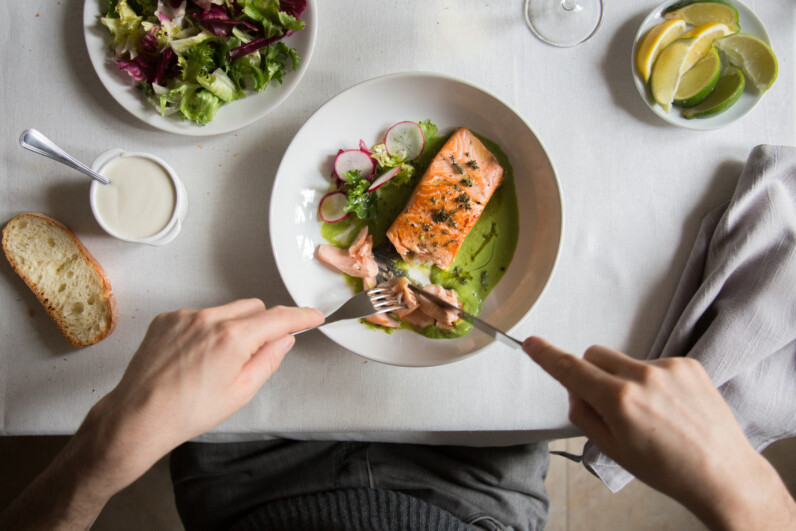
Informed decisions for healthy, sustainable diets
And those are the facts. We embrace plant foods as a vital component of healthy diets! However, there’s no denying the quality nutrition provided by certain animal foods and, in some cases, their preferential environmental footprint.
Seafood, including farmed salmon, is a “protein with benefits,” as the experts at the Seafood Nutrition Partnership like to say. You can continue to make farmed salmon part of a healthy, balanced diet, and we will continue sharing credible, accurate information to support your decision-making. If you have further questions, don’t hesitate to get in touch!
